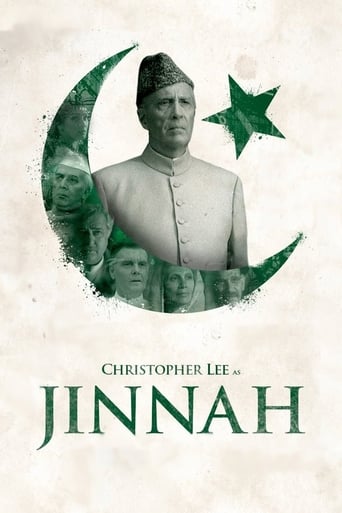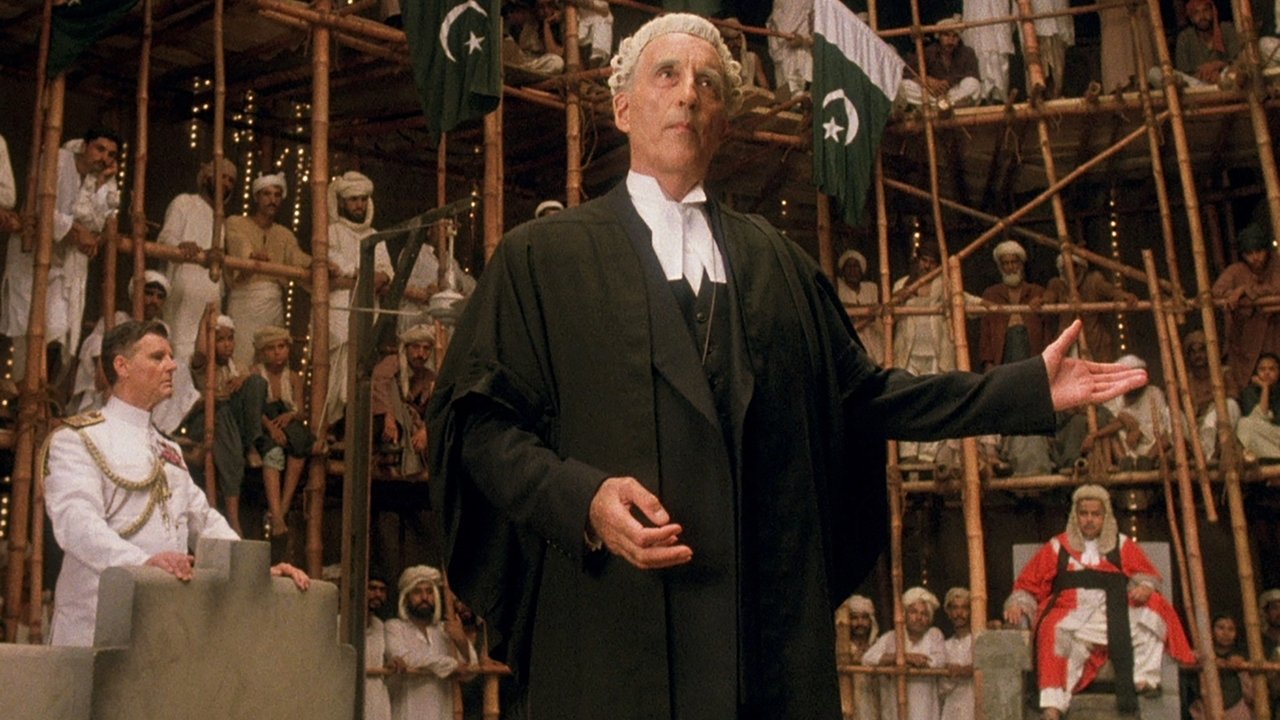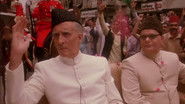Murtaza Ali
Jinnah, directed by Jamil Dehlavi, is a 1998 controversial biopic about the founder of Pakistan, Muhammad Ali Jinnah. Renowned Islamic scholar Akbar Salahuddin Ahmed wrote the movie's screenplay. Jinnah stars the legendary English actor Sir Christopher Lee in the titular role. The movie costars Shashi Kapoor, Richard Lintern, James Fox, Indira Verma, Maria Aitken, and Talat Hussain. Dehlavi, a London-based filmmaker of Pakistani-French origin, is best known for The Blood of Hussain (1980)—a highly contentious, critically acclaimed film banned by the Pakistani military dictator at the time, Muhammad Zia-ul-Haq, as he believed the movie purposefully took digs at his tyrannical regime. Dehlavi effectively got relegated to the status of a persona non grata in Pakistan. Dejected and heartbroken, he later moved to the UK in want of creative freedom. Unfortunately, Dehlavi's controversial past would come back to haunt him two decades later during the filming of Jinnah.Dehlavi's contentious choice of making a western Christian—that too someone whose most famous portrayal hitherto had been that of Count Dracula—to portray the part of Muhammad Ali Jinnah didn't go well with the extremist elements in Pakistan. The government of Pakistan withdrew its funding halfway through the film. Christopher Lee received death threats and the activists demanded for his arrest and deportation; Lee had to be surrounded by armed bodyguards throughout the shoot. As a result, Jinnah was never really afforded a proper theatrical release in Pakistan. Christopher Lee considers Jinnah to be the greatest achievement of his long and illustrious career.The cinematic importance of Dehlavi's film can be easily gauged by the fact that till date it has been cinema's first and only major attempt at capturing in essence the philosophies and principles that underlined Muhammad Ali Jinnah's life. Before examining the movie further, it's essential to first try and demystify the enigma that was its subject: Muhammad Ali Jinnah. And, in order to fully grasp that, one needs to take the cognizance of the stature that Mr. Jinnah enjoyed at the time of independence. In many ways, he was Mohandas Karamchand Gandhi's arch nemesis, if ever there is one. In fact, it wouldn't be a hyperbole that, at the time, among Mr. Gandhi, Mr. Jinnah and Lord Mountbatten the future of India hung in the balance.The official announcement of the Partition of India, as per the Mountbatten Plan, triggered a chaos on both sides of the newly established border as massive population exchanges started occurring between the two newly formed states in the months that immediately followed. The end result was a massacre of humongous proportions that claimed hundreds of thousands of innocent lives (mostly Hindus, Muslims, and Sikhs) on both sides of the border. Jinnah being the grand architect behind the partition of British India into two separate states based on religion, a Hindu state and a Muslim state, was hailed as a hero in the newly formed state of Pakistan. But, in India, he was dubbed as a villain, was held responsible for the deaths of hundreds of thousands of innocent people. More than six decades have past but very little has changed. Mr. Jinnah continues to remain one of the most enigmatic, controversial and misunderstood figures in History.The treatment that Dehlavi gives his movie is no less interesting than his subject. He chooses to present Mr. Jinnah's tale in form of flashbacks. The opening scene of the movie shows a terminally ill Mr. Jinnah, accompanied by his sister and confidante Fatima Jinnah, being taken in an ambulance to some hospital. The next scene cuts to an anteroom situated somewhere between Heaven and Hell where Mr. Jinnah is greeted by a friendly, humanoid Angel (played by Shashi Kapoor) who has an hour and a half to prepare Mr. Jinnah's case, the outcome of which would decide his fate. Will he be convicted or absolved? Will he go to Hell or Heaven? As Mr. Jinnah defends the accusations made against him, the audience is treated to sumptuous vignettes from different junctures in History as the story follows important events in Mr. Jinnah's life (not necessary in a linear fashion): be it his early days as a love- struck lawyer who dotes on a beautiful Parsi girl named Ruttie (whom he eventually married); his later days as the greatest adversary of Mahatma Gandhi; or his brief stint as the 1st Governor General of Pakistan before finally succumbing to tuberculosis. Overall, Jinnah proves to be an important work of cinema that presents the caricature of a highly misunderstood man whose turbulent but celebrated life made his name a synonym for controversy. Jinnah had the courage to do what he felt was right for the greater good of his people. Although the movie is far from being flawless, it works well on the whole. The historical accuracy is undeniably questionable. The movie might upset those who lack forbearance. While the movie scandalizes Lord Mountbatten for being biased towards India, it takes a rather playful swipe at Mr. Nehru and Lady Mountbatten. Christopher Lee plays the part of older Jinnah with scalpel-like precision, Richard Lintern deserves a special mention for his arresting portrayal of the young Jinnah. James Fox (who plays Lord Mountbatten) and Maria Aitken (who plays Lady Mountbatten) are nothing short of being brilliant. Shashi Kapoor is charming to watch in the role of an Angel. These major performances are well backed up by the movie's support cast. But, Jinnah is not a movie for everyone.Only those with open minds should watch it, for it's bound to hurt the sentiments of those who lack tolerance and empathy. 9/10A more in-depth review can be read at:http://www.apotpourriofvestiges.com/
balajiviswanathan
I'm an Indian who wanted to learn about Mr. Jinnah. But, I didn't learn a lot of new stuff and was a quite disappointed. The good stuff: 1.Lee's acting was quite good and he was quite good for the part. Though he is not Ben Kinsley, he is the main pivot here. 2. Mahatma and Nehru, though portrayed by weak actors, were not depicted too negatively. 3.For a Pakistani film, the film was reasonably professional.Bad stuff: 1. Younger Jinnah (Lintern) never looked/spoke remotely South Asian. It looked more like the director was trying too much to play to the Western audience. 2. A lot of times the scenes were ridiculous like Gandhiji staring his computer etc. 3. Jinnah's sister in most of the movie really looked like a witch, and maybe she was one.4. Throughout the movie the Hindus were predators and muslims were shown the prey/reactors. On the contrary while only 10% of Muslims were forced to flee India, 90% of Hindus in Pakistan were either slaughtered or become refugees in India. If Hindus were as blood thirsty as was portrayed in the movie, we would not have let 200 million muslims to stay in our country. Both sides had their victims and evil forces.5.Maharaja of Kashmir signed the ascension to India after Jinnah invaded Kashmir while the movie totally ignored the crucial fact. 6. There was far too much stress on Edwina-Nehru that at some point I felt it was Nehru/Edwina's biopic rather than Jinnah's. 7. If Civil disobedience and Nonviolence made one a Hindu as depicted in the movie, then Rev. Martin Luther King, Nelson Mandela and Henry Thoreau must all be Hindus! Nonviolence is beyond religion and as shown in the movie, Jinnah failed to grasp it. 8. Mountbatten's portrayal was horrible. He was shown to be without humor, grace, etc. While Pakistanis are right to claim that Jinnah created their nation for them from India, they must also remember that there would be nothing called Pakistan had British India not won her Independence. Jinnah did relatively nothing to win independence to India and that is a fact. If not for Gandhi, India would have taken a few more decades to gain independence and by that time Quaid and his ideas of Partition would have long been dead.I would give an above-average rating of 6 for a relatively bold story telling and good acting, but on the whole it was quite disappointing.
rasikararaja
This movie is totally one sided and it was expected.It is impossible for any one from Pakistan or India to make a movie about our founding fathers without showing the other side in negatively. The intentions of both the founding fathers,Mr.Jinnah and Mr.Gandhi were good but they failed miserably in creating leaders who would carry forward their plans. Mr.Jinnah will be turning in his grave after the state in which Pakistan currently is ,same thing can be said about India as well.They say hindsight is always 20/20. What would have happened if both Mr.Jinnah and Mr.Gandhi were to study in USA rather than Great Britain. The ideas they would have had might have been different and they may have dealt the issue differently. The reason is , the would have influenced more on Democracy and power to the people rather than the monarchy the style which most of the politicians from both side have inherited.
colin-265
I thoroughly enjoyed Jinnah and it told the truth unlike Ghandi. The film never got the distribution it deserved in the USA nor surprisingly in England. Why is it that Christopher Lee, the most underrated actor of all time, was never nominated for an award for his superb portrayal of Jinnah? Why was it that this excellent film was passed over? I found it compulsive and once I got used to the strange beginning (angel debating whether Jinnah goes to Heaven or Hell)I was hooked. I would have given it 10 but for the silly scene (location in between Heaven and Hell) with Nehru and Ghandi looking at computer screens..... The trial of Mountbatten. however, was very interesting and clever. If you haven't seen this movie you need to and it is now available on DVD in UK and USA.


 AD
AD





